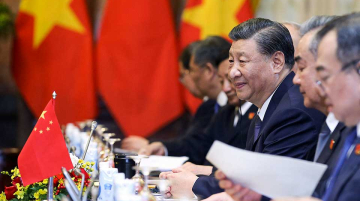
By Innocent Batsani-Ncube
When Sitiveni Rabuka was elected Fiji’s Prime Minister after a very close parliamentary vote in December 2022, expectations were high — especially in Australia and other Western capitals — that his government would make good on his election campaign commitment to pivot away from China’s influence because according to him, Fiji resonated more with the West than with China.
Most importantly, Rabuka targeted Fiji’s policing deal with China as an example of this pivot and promised to scrap it once he got into power. True to his word, soon after he got into government, one of his first acts was to signal that Fiji would cancel its policing agreement with China. However, in March 2024, less than two years into its tenure, the Rabuka government recanted this decision. Why did this happen, and what lessons can we draw from it?
The first lesson is that contrary to conventional perceptions, China’s engagement mechanisms with countries in the Global South seem more entrenched and useful for recipient governments. Ostensibly, when Sitiveni Rabuka was challenging the policing deal, he thought of it as an arrangement that aided former Prime Minister Frank Bainimarama and the Fiji First party’s hold on power, as well as China’s “disproportionate influence” in Fiji public affairs.
However, his government’s turnaround illustrates that it has found that the policing deal — which guarantees continued training of Fijian police officers in China and the provision of state-of-the-art policing and surveillance equipment — at least serves the national interest, if not its own survival. Therefore, political turnover does not necessarily translate to the abrogation of Chinese government interventions and the reduction of its influence.
Secondly, our interpretation of political elites’ attitudes towards China should account for their positionality. Their perspectives on China could be influenced by whether they are in government or the opposition. While he was campaigning for public office — and during the political honeymoon period soon after the election — Sitiveni Rabuka was highly critical of China and seemed to make unambiguous promises to walk back Bainimarama’s pro-China policies and programs. However, as the reality of governing sunk in, he seems to have realized the utility of China’s interventions.
Regarding the policing deal, Rabuka recanted his commitment to cancel the agreement even when his government had reportedly signed a comparable security agreement with Australia. This is significant. This meant that the Fiji government had weighed its options and realized it would still be better off keeping its policing arrangement with China.
The takeaway from this is that while anti-China sentiment is more prevalent in opposition circles, when the same people get into government, the realities of government force them to temper their rhetoric, leading to the pursuit of continuity rather than abrogation of existing China-supported interventions.
Thirdly, the lackluster attitude of Western actors provides shoo-in opportunities for China to consolidate its hold. When Rabuka was elected, Australia — as the regional hegemon — could undercut China’s influence by providing direct alternatives to what the Chinese government offered to Fiji. The continuation of the China policing deal clearly demonstrates a lack of competitive options to which the Rabuka government would default.
It is apparent from how China’s Fiji policing model is sought after by other countries in the Pacific — such as Papua New Guinea and the Solomon Islands, among others — that China may be the option of choice for countries in the Pacific yearning for enhanced domestic security.
In sum, we learn that China’s engagement mechanisms with countries in the Global South seem more entrenched than widely thought and that political elites’ attitudes towards China and Chinese government programs are primarily influenced by their positionality. They are bound to be more critical in opposition, but they tend to be circumspect when they get into government. The reality is that notwithstanding governmental turnover, the utility of Chinese government programs — and thus influence — subsists.
Dr. Innocent Batsani-Ncube is an Associate at China Foresight, LSE IDEAS, and Lecturer and Convenor of the China in the Global South module at the School of Politics and International Relations, Queen Mary University of London.







